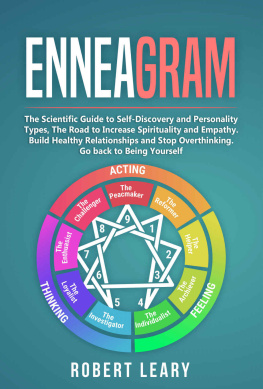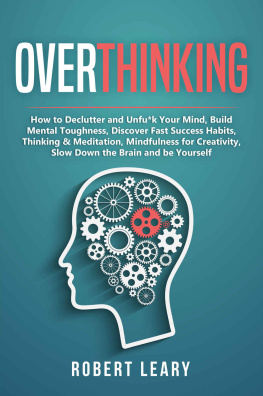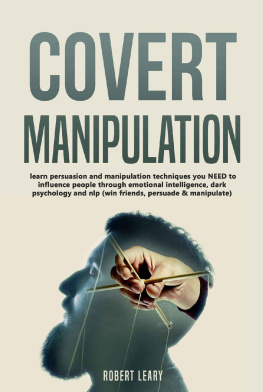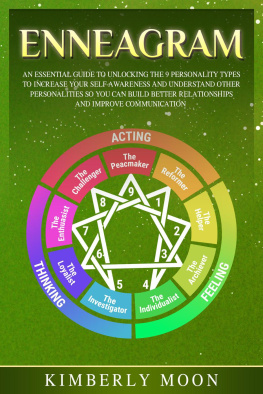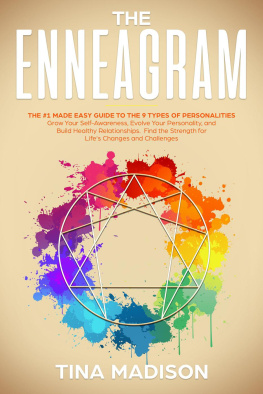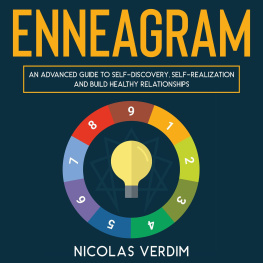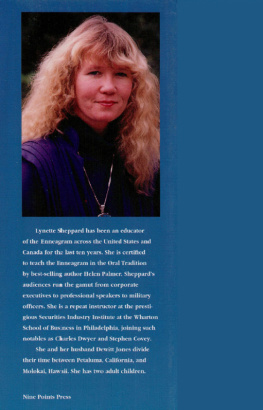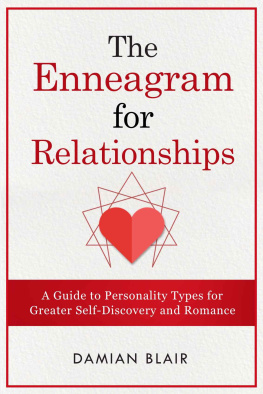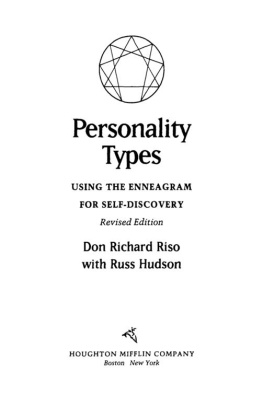The Scientific Guide to Self-Discovery and Improvement.
The Path to Increased Spirituality and Empathy that You Need. Build Healthy Relationships and Stop Overthinking.
Go Back to Being Yourself.
Introduction
Congratulations on purchasing this book on the Enneagram of personality and thank you for doing so. Within the following chapters, youll be guided through the first few steps of a potentially life-changing journey of personal development, empathetic enlightenment, and spiritual growth. Im excited to share this journey with you, and I have no doubt that once you get started, youll be glad you chose this path, too.
I havent always been interested in personality typing systems. Like most adolescents, I grew up thinking that my personalitymy thoughts, feelings, behaviors, preferences, and perspectiveswere essentially normal, average, and reasonable; that any person put in my position, given access to the same information, influenced by the same authority figures, exposed to the same experiences, would likely make the same choices that I did. Whenever I would encounter someone whose viewpoint didnt make sense to me, or whenever I would find myself in a conflict that I didnt fully understand, I would resign to writing off the other person (or people) involved as crazy, moody, or misinformed. I believed that I was good at communicating, and that if anyone else had trouble understanding my actions, that was their problem. And though I probably never would have admitted it back then, over time, I was developing a nagging internal fear that I might be wrong; that I might be the moody, crazy, misinformed one; that my perspective included a fair number of blind spots; that maybe-- just maybe the problem wasnt that everyone else was insane. Maybe the problem was that, from where I was standing, I couldnt see the reasons behind their actions. Maybe other people couldnt see my reasons, either, and that was why they couldnt understand me, my behaviors, my choices, or my beliefs.
When I finally found the Enneagram, it felt like taking off sunglasses that I hadnt realized Id been wearing my entire life. I was like Dorothy in the first full-color scene in The Wizard of Oz , amazed at all the diversity and depth Id been missing out on beforehand. Through learning about this personality typing system, I was able to put many of my past experiences into context, understand nuances Id previously been blinded to, and empathize with people who had once mystified, or even infuriated, me. More importantly, I was led to discover some interesting truths about myself, ones that I might never have come to terms with otherwise.
Like any personality typing system, the Enneagram is not a scientific method; it is subjective, and impossible to measure with any standard of precision or accuracy. That being said, the Enneagram can still be extraordinarily powerful when used as a creative tool, rather than a yardstick. It can help to improve communication between friends, family members, and romantic partners; it can build stronger, more harmonious team dynamics in work environments; and it can help to steer any individual towards personal growth and fulfillment. It provides a vocabulary through which we can discuss difficult subjects and free ourselves from the rhetoric of blame and malicious intent. Finally, it consistently works to remind us that our personality types are dynamic, not fixed, so each and every one of us has the capacity to learn, grow, change, and evolve. We all have it in us to become heroes, villains, or apathetic bystanders. What defines us, in the end, are the choices we make, and the reasons we make them.
I have every hope that this book will spark your curiosity, entertain and enlighten you, and inspire you to share its contents with the most important people in your life. There are lots of books about the Enneagram on the market today, so thank you again for choosing this one. Every effort was made to ensure it is full of as much useful and accurate information as possible. Please enjoy!
Chapter 1: What is the Enneagram?
The Enneagram is a personality assessment tool that is popularly used to promote self-discovery, encourage empathy, and foster personal growth. It references nine primary archetypes, or personality categories, each associated with a numerical value. These numerical values are charted on various points of the Enneagrams physical representation as a geometric shape (see figure below). The relationships between these symbolic numbers correlate to the interpersonal behaviors exhibited and experienced by the represented types.

These archetypes arent quite like those you might find in fictional settings. None are particularly benevolent or nefarious; they are neither inherently masculine nor feminine. These archetypes dont adhere to cultural, religious, or familial roles, and the varied types show up in every imaginable walk of life, amongst the wealthy and impoverished, the uneducated and the academically distinguished, the young and the old. Each Enneagram personality archetype, or enneatype as well refer to them henceforth, is a description of an individuals primary motivating force, or inner emotional drive, rather than a characterization of their outward appearance or their role in any social group.
The Enneagram does not evaluate you based on the way that others perceive you, or the ways in which you interact with them; it is primarily based upon self-reported evidence, which is why it cannot claim to be a technical or scientific method. That being said, the fact that enneatype testing and Enneagram growth work are so heavily focused on self-awareness, rather than externally imposed measurement and analyses, is exactly what makes this method so effective for many people. It may take longer to identify our own types than it would for others to judge and convey their impressions to us in the name of guidance; but the journey to find oneself can be healing and rewarding, as well as character-building. Furthermore, when we are able to see ourselves in more than just one of the archetype descriptions, we subconsciously work to enhance our empathetic capacities by considering the world from varying vantage points.
It may help to think of the enneatypes not as different personalities, but rather, as different forms of modus operandi. They do not accurately predict what colors, flavors, or textures well enjoy most, or what genres of music and literature will spark our interests; they dont always determine the degrees of introversion or extroversion that we display; they cannot always explain the types of careers, lifestyles, and lovers that we choose. Instead, the enneatypes describe road maps, blue prints, or operating systems. They plot out the varied ways in which people interact with the world based on differing perspectives. The Enneagram focuses on the motivations behind actions, and furthermore, how these motivations are often defined early in life by experiences that teach us what our role in life should be, or how best to survive in the face of risk and uncertainty.
Where does the Enneagram come from?
The origins of the Enneagram theory are shrouded in mystery. There is some evidence to suggest that it originated in Alexandria, in the 4 th century BC, evolving from the theories of Christian mystic Evagrius Ponticus (also known as Evagrius the Solitary) which spoke of eight deadly thoughts, or logismoi, their eight remedies, called holy thoughts, and one overarching supreme thought to rule over all others: the notion of self-love. This origin story cannot be proven, however, and there are many who believe the concepts of the Enneagram archetypes have earlier roots in the era of ancient mythology.

